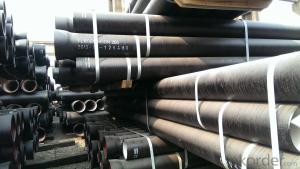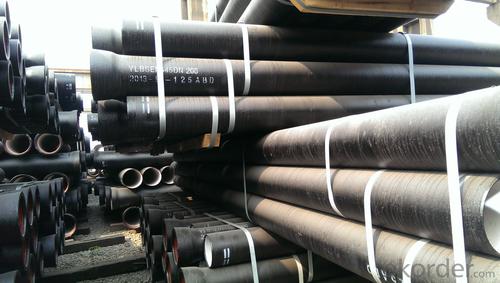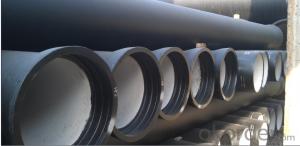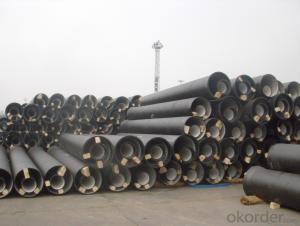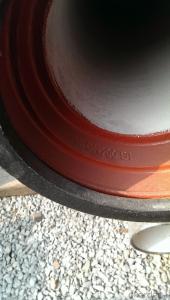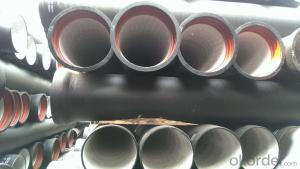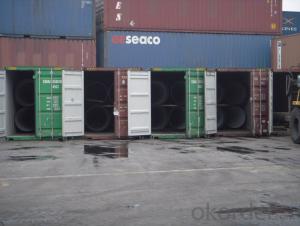DUCTILE IRON PIPE K12 DN 1000 SOCKET SPIGOT PIPES
- Loading Port:
- Tianjin
- Payment Terms:
- TT OR LC
- Min Order Qty:
- 25 m.t.
- Supply Capability:
- 30000 m.t./month
OKorder Service Pledge
OKorder Financial Service
You Might Also Like
1) The standard of pipe: ISO2531:1998, EN545:2006,K9 K8
2) Effective length: 6m/5.7m
3) Inner cement line: Portland cement lineas per ISO4179
4) Zinc coating: at least 130g/m2 as per ISO8179
5) Bitumen painting: at least 70μm as per ISO8179
6)With 102% quantity of NBR, SBR, or EPDM ring asper ISO4633
7) DN80-DN1200
8) Highstrength, lighter than grey iron, good corrosion resistance, no furring, smallflow resistance, easy fixing, long life tome about 100 yeas
9)Checked by automatic inspection equipment
10) Composition:
Chemical composition | |||
Chemical composition | Ductile Cast Iron Pipe (%) | Grey iron pipe (%) | Steel pipe (%) |
C | 3.5-4.0 | 3.2-3.8 | 0.1-0.2 |
Si | 1.9-2.6 | 1.4-2.2 | 0.15-0.4 |
Mn | 0.15-0.45 | 0.4-0.6 | 0.3-0.6 |
P | ≤0.06 | ≤0.3 | 0.02-0.03 |
S | ≤0.02 | ≤0.1 | 0.02-0.03 |
Mg | 0.03-0.06 |
|
|
11) Feature:
Mechanical properties | |||
| Ductile Cast Iron Pipe | Grey Iron Pipe | Steel Pipe |
Tensile Strength(Mpa) | ≥420 | 150-260 | ≥400 |
Yield Strength(Mpa) | ≥300 | No Confirmation | No Confirmation |
Bending Strength(Mpa) | ≥590 | 200-360 | ≥400 |
Elongation (%) | ≥10 | Neglected | ≥18 |
Brinell Hardness(HBS) | ≤230 | ≤230 | About 140 |
12) T type mechanical joint
13) Packing: in bulk or container
PACKING: 1) Pipesare bundled together with the steel belt.
2) Wooden pieces are put between the pipes.
- Q: What is the typical pressure rating of ductile iron pipes?
- The typical pressure rating of ductile iron pipes ranges from 150 to 350 PSI (pounds per square inch), depending on the diameter and class of the pipe.
- Q: Can ductile iron pipe be used for bridge crossings?
- Ductile iron pipe is suitable for bridge crossings due to its strength, durability, and flexibility. Its high tensile strength enables it to bear heavy loads and vibrations, making it ideal for supporting bridges and withstanding traffic weight. Moreover, the pipe's flexibility allows it to absorb movements and deformations caused by temperature changes, settling, and other factors, minimizing the risk of structural damage and ensuring the bridge crossing's longevity. Additionally, the pipe's resistance to corrosion makes it a dependable choice for bridge crossings exposed to moisture, chemicals, and other corrosive elements. Overall, ductile iron pipe possesses properties that make it a reliable and appropriate material for bridge crossings.
- Q: Are ductile iron pipes resistant to chemical attacks?
- Yes, ductile iron pipes are generally resistant to chemical attacks. They have a protective lining that prevents the corrosive effects of various chemicals, making them suitable for transporting a wide range of liquids including water, sewage, and industrial waste.
- Q: What are the typical lengths of ductile iron pipes?
- The typical lengths of ductile iron pipes range from 18 feet to 20 feet, although shorter lengths such as 10 feet or longer lengths such as 40 feet can also be found depending on specific project requirements.
- Q: How do ductile iron pipes handle thermal cycling in industrial applications?
- Ductile iron pipes are well-suited for handling thermal cycling in industrial applications. Due to their high thermal conductivity and low thermal expansion coefficient, they can effectively and safely withstand the stresses caused by repeated heating and cooling cycles. This makes them highly resistant to cracking, distortion, or other forms of thermal damage, ensuring their durability and reliability in industrial environments.
- Q: How do ductile iron pipes perform in extreme weather conditions?
- Ductile iron pipes have excellent performance in extreme weather conditions. Their high tensile strength and flexibility allow them to withstand freezing temperatures, heavy snow loads, and extreme heat without cracking or breaking. Additionally, their corrosion-resistant properties make them highly durable and reliable in harsh weather environments, ensuring long-term performance and minimal maintenance requirements.
- Q: Can the underground cast iron pipes be connected with clamps to form buttress?
- Best not to, because the use of clamp connection way to connect the poor integrity of the pipeline, the base treatment is not in place or uneven settlement, it is easy to produce deformation, resulting in pipe bending deformation, easily leaked from the junction.
- Q: What is the expected abrasion resistance of ductile iron pipes?
- Ductile iron pipes possess a high level of abrasion resistance, which is widely acknowledged. These pipes are renowned for their durability and strength, making them suitable for a range of applications, such as the conveyance of water, sewage, and other fluids. The composition of ductile iron pipes, containing significant amounts of carbon and silicon, contributes to their ability to withstand abrasion. The design of ductile iron pipes is specifically tailored to withstand the abrasive forces that can arise during fluid transportation. These pipes feature a smooth internal surface, which reduces friction and minimizes the risk of abrasion. Moreover, the inherent toughness and resistance to wear and tear exhibited by the material make ductile iron pipes less susceptible to damage caused by abrasive particles or debris present in the fluid flow. However, it is crucial to understand that the expected abrasion resistance of ductile iron pipes can vary depending on several factors, including the velocity and nature of the transported fluid, the presence of corrosive substances, and the installation conditions. In certain instances, additional protective measures, like linings or coatings, may be necessary to bolster the pipes' resistance to abrasion. In conclusion, ductile iron pipes are renowned for their exceptional abrasion resistance, but it is always advisable to consider specific application requirements and seek advice from experts to ensure the appropriate selection and installation of the pipes, thereby guaranteeing optimal performance and longevity.
- Q: What is the expected deflection limit of ductile iron pipes?
- The expected deflection limit of ductile iron pipes is typically around 2% of the pipe's diameter, as per industry standards.
- Q: Are ductile iron pipes suitable for use in residential plumbing?
- Ductile iron pipes are indeed a suitable choice for residential plumbing. This material, known for its strength and durability, is resistant to corrosion, making it highly advantageous for plumbing systems. With its remarkable tensile strength, ductile iron pipes can endure high pressure and are less prone to cracking or breaking, unlike other materials. Moreover, these pipes are renowned for their extensive lifespan, lasting over 100 years, guaranteeing reliability in residential plumbing systems. Furthermore, ductile iron pipes exhibit exceptional flow characteristics, ensuring efficient water distribution throughout the entire household. In conclusion, the strength, durability, and corrosion resistance of ductile iron pipes render them a fitting and long-lasting solution for residential plumbing needs.
Send your message to us
DUCTILE IRON PIPE K12 DN 1000 SOCKET SPIGOT PIPES
- Loading Port:
- Tianjin
- Payment Terms:
- TT OR LC
- Min Order Qty:
- 25 m.t.
- Supply Capability:
- 30000 m.t./month
OKorder Service Pledge
OKorder Financial Service
Similar products
Hot products
Hot Searches
Related keywords
